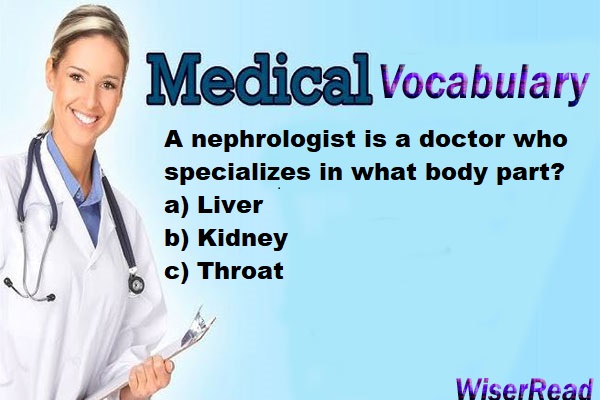Welcome to the Medical Vocabulary Quiz—a fun and informative way to test your knowledge of essential terms used in healthcare and medicine! Whether you’re a student, professional, or simply someone curious about the language of the medical world.
This quiz will challenge your understanding of key concepts. With detailed answers provided, it’s not only a great learning tool but also an opportunity to sharpen your medical lexicon. Ready to put your knowledge to the test?
Medical Vocabulary Quiz With Answers
Here’s a short and easy-to-understand Medical Vocabulary Quiz with 20 multiple-choice questions (MCQs) designed to test basic medical terminology:
Give also vocabulary quiz: Hotel Vocabulary Quiz
Family Vocabulary Quiz With Answers
Example and exercise of the Medical Vocabulary Quiz
1. The children’s _______ is located on the fourth floor of the hospital.
a) transplant
b) Vein
c) ward
2. Your blood count is not within normal range, so you may have..
a) anaemia
b) amnesia
c) dementia
3. _______ from this medication include nausea and depression
a) Stresses
b) Side effects
c) Spasms
4. The patient has asked for some _______ while her family is visiting.
a) Privacy
b) poison
c) scrub up
5. You couldn’t have inherited the disease because it is not
a) genetic
b) feverish
c) allergic
6. The physician will be monitoring your _______ to make sure it isn’t cancerous.
a) Pharmacist
b) growth
c) laboratory
7. Defibrillators are used when there is a problem with what body part?
a) Spine
b) Wrist
c) Heart
8. The Patella is more commonly known as what?
a) Knee cap
b) Adam’s apple
c) Funnybone
9. A nephrologist is a doctor who specializes in what body part?
a) Liver
b) Kidney
c) Throat
10. Which of these maladies is a contusion?
a) A cut
b) A bruise
c) A broken arm
11. What does the prefix “hyper-” mean?
a) Below
b) Above or excessive
c) Inside
12. What is the meaning of the term “cardiology”?
a) Study of bones
b) Study of the heart
c) Study of muscles
13. Which term refers to the “inflammation of the liver”?
a) Hepatitis
b) Pneumonia
c) Gastritis
14. What does the medical term “anemia” refer to?
a) High blood pressure
b) Lack of red blood cells
c) Swelling of the body
15. What does the suffix “-ectomy” mean?
a) Removal of a part of the body
b) Inflammation
c) Study of
d) Enlargement
16. What is the meaning of the term “dermatology”?
a) Study of digestion
b) Study of the skin
c) Study of the lungs
17. Which of the following is a common term for “hypertension”?
a) Low blood pressure
b) High blood pressure
c) High cholesterol
18. What does “tachycardia” refer to?
a) Slow heart rate
b) Fast heart rate
c) Abnormal breathing
19. What does the term “neurology” refer to?
a) Study of the heart
b) Study of the nervous system
c) Study of the digestive system
20. What is the meaning of “fracture”?
a) Infection
b) Broken bone
c) Swelling
Answers of all questions on Health vocabulary quiz
- c) ward
- a) anaemia
- b) Side effects
- a) Privacy
- a) genetic
- b) growth
- c) Heart
- a) Knee cap
- b) Kidney
- b) A bruise
- b) Above or excessive
- b) Study of the heart
- a) Hepatitis
- b) Lack of red blood cells
- a) Removal of a part of the body
- b) Study of the skin
- b) High blood pressure
- b) Fast heart rate
- b) Study of the nervous system
- b) Broken bone
FAQ’s on Health Vocabulary Quiz
Here are some unique and easy-to-understand Frequently Asked Questions (FAQs) related to Medical Vocabulary or Health Vocabulary:
1. What is medical vocabulary?
Medical vocabulary refers to the specialized language used by healthcare professionals to describe medical conditions, procedures, anatomy, treatments, and more. It includes terms that are used to identify diseases, symptoms, body parts, treatments, and medical equipment, often derived from Latin and Greek roots.
2. Why is it important to learn medical vocabulary?
Learning medical vocabulary is essential for understanding health-related topics, communicating effectively with healthcare providers, and making informed decisions about your health.
It helps both patients and professionals understand diagnoses, treatments, medications, and the human body.
3. What are some common medical prefixes and what do they mean?
Medical prefixes are added to the beginning of a word to modify its meaning. Some common examples include:
- Hyper- (above or excessive)
- Hypo- (below or deficient)
- Brady- (slow)
- Tachy- (fast)
- Neo- (new)
4. What does the suffix “-itis” mean in medical terms?
The suffix “-itis” is commonly used to indicate inflammation. For example:
- Arthritis: Inflammation of the joints
- Tonsillitis: Inflammation of the tonsils
5. How can learning medical vocabulary help me as a patient?
As a patient, understanding medical terminology can help you:
- Better understand your diagnosis and treatment plan
- Ask informed questions during doctor visits
- Comprehend instructions on medications or procedures
- Advocate for your health more effectively
6. What is the difference between medical terminology and general health vocabulary?
Medical terminology is the precise language used by healthcare professionals to describe medical conditions, anatomy, and procedures, often using Latin or Greek roots.
Health vocabulary, on the other hand, is a broader term and may include words related to wellness, lifestyle, and common health issues, but without the technical specificity of medical terminology.
7. What are some examples of medical terms used to describe parts of the body?
Some common anatomical terms include:
- Cardio-: Heart
- Gastro-: Stomach
- Derm-: Skin
- Neuro-: Nerves or nervous system
- Osteo-: Bone
What is the role of medical abbreviations in healthcare?
Medical abbreviations are used to simplify communication among healthcare providers.
They save time and space in medical charts, prescriptions, and notes. Some common examples include:
- BP: Blood Pressure
- HR: Heart Rate
- MRI: Magnetic Resonance Imaging
- IV: Intravenous

